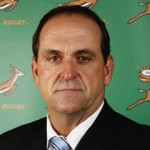 South Africa’s top referees scrummed against each and were given master classes from top coaches as part of a recently completed four-day training camp prior to the start of the 2012 rugby season.
South Africa’s top referees scrummed against each and were given master classes from top coaches as part of a recently completed four-day training camp prior to the start of the 2012 rugby season.
Former Springbok prop Balie Swart had SA’s top whistlers packing down to demystify the intricacies of scrumming while Rassie Erasmus and Rudolph Straeuli took referees through examples of their pre-match analysis. They also put the match officials through the same training drills used by many of the teams.
“Feedback from those attending – and it included referees with Rugby World Cup experience – was that the pre-season camp was one of the best of its kind they had yet experienced,” said South African Rugby Union general manager of referees André Watson.
“In addition to the technical Law reviews and input from experienced coaches, they also underwent fitness testing, completed the updated BokSmart programme, participated in a motivational/self-analysis presentation and wrote the National Laws Exam.
“I’m confident that our Super and National Panel referees are now well prepared for the season and I’m personally looking forward to the first blast of the whistle on opening day.”
Material covered at the SA Referees’ Camp at Konka included the outcomes of a recent Sanzar workshop.
“We’re committed to ensuring uniform application of the Laws across all of the rugby competitions in which we officiate,” said Watson. “We met in Sydney with our Sanzar partners in the middle of January and agreed on protocols for the coming season.
“While there are no Law changes to be implemented, it was a platform to review the highs and lows of last year and agree on common expectations for the coming year.”
The so-called ‘Big Five’ – tackle, scrum, offside, ruck, and maul – remain the priority areas as in previous years but with additional emphasis on the following points:
Scrum
Alignment – front rows must be in a position to interlock on engagement; there must be no touching of heads.
Early engagement – both teams must start the engagement process simultaneously on the referee’s call.
Engagement angles – front rows must push straight and parallel to the touchlines; loose-head props must not ‘walk’ the scrum around the tight-head.
Binding – front rankers must bind on their opponent in the appropriate manner; no hands on the ground for support.
Post-engagement infringements – illegal wheeling on purpose, so-called ‘whip wheeling’ and not pushing straight and parallel to the touchline are all actions to be penalised.
Tackle
The tackler must release and clear away after the tackler.
The tackler-assist must release in a clear and obvious manner before going for the ball.
Arriving players must not go past the ball into an offside position and try to obstruct the opposition going for the ball.
Players must respect the offside lines at the ruck and maul (the hindmost foot of their player in the ruck or maul).
Arriving players not attempting to clean-out the opposition must demonstrate positive actions to stay on their feet.
A player who uses correct technique but ends up off his feet after removing a threat is not penalised.
Assistant Referees at Vodacom Super Rugby level will also be called on to take a more involved approach to the game without becoming an interference or hindrance to the referee. This will involve greater monitoring of offside lines at the ruck and maul and infringements close to the touchline where the referee may be unsighted.
“Arriving players must not go past the ball into an offside position and try to obstruct the opposition going for the ball”
Some thinking to be done by the NZ teams, what will they conjure up next.
“A player who uses correct technique but ends up off his feet after removing a threat is not penalized”
Here is the loophole.
Who will be penalized most and who not?
Interesting how NH teams will adapt. Looking at European and English rugby, they also go past the ball to obstruct.
Users Online
Total 189 users including 0 member, 189 guests, 0 bot online
Most users ever online were 3735, on 31 August 2022 @ 6:23 pm